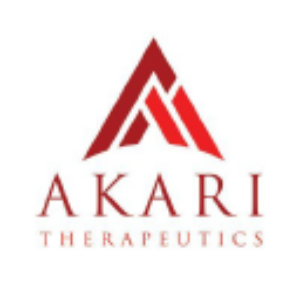Akari Therapeutics Presents Promising Immuno-Oncology Data for its Novel Splicing-Targeted ADC Payload Driving Immune Activation, Both as Single Agent and in Combination with Anti-PD1 Checkpoint Inhibitors
Rhea-AI Summary
Akari Therapeutics (NASDAQ: AKTX) presented preclinical immuno-oncology data for its novel spliceosome-targeting ADC payload, PH1, at the 40th Annual SITC Meeting on November 10, 2025. The data show PH1 drives cancer cell cytotoxicity and broad immune activation, including macrophage polarization, neutrophil increases, B-cell/IgM expansion, and gamma-delta T-cell expansion when combined with anti-PD1.
In an immune-competent HER2-positive colon tumor model, Trastuzumab-PH1 + anti-PD1 produced complete responses in 74% vs 42% (p<0.05) compared with Kadcyla + anti-PD1. Akari is advancing lead candidate AKTX-101 (Trop2-PH1) into IND-enabling studies and will host a live webcast on Nov 18, 2025 at 11:00 AM ET.
Positive
- Complete responses 74% vs 42% (p<0.05) in HER2+ colon model
- PH1 induces RNA mis-splicing and neoantigen generation
- Observed expansion of B-cell clones and IgM antibodies
- Initiating IND-enabling studies for lead ADC AKTX-101
Negative
- Data are preclinical; clinical safety and efficacy in humans unproven
- Efficacy comparison reported in a single HER2-positive colon cancer model
News Market Reaction
On the day this news was published, AKTX declined 1.64%, reflecting a mild negative market reaction. Argus tracked a peak move of +19.2% during that session. Argus tracked a trough of -5.0% from its starting point during tracking. Our momentum scanner triggered 8 alerts that day, indicating moderate trading interest and price volatility. This price movement removed approximately $380K from the company's valuation, bringing the market cap to $23M at that time.
Data tracked by StockTitan Argus on the day of publication.
Data presented at the 40th Annual Society for Immunotherapy of Cancer (SITC) Meeting
The spliceosome targeting payload, PH1, demonstrates the ability to induce both cancer cell cytotoxicity and activation of anti-tumor immunity through multiple mechanisms
Treatment with a Trastuzumab-PH1 ADC monotherapy drove macrophages to polarize into an anti-tumor/inflammatory state and caused expansion of B cell clones and subsequent IgM antibodies
When combined with anti-PD1 therapy, additional effects included expansion of Gamma-Delta T cell clones demonstrating that the combined regimen drives innate, adaptive, and humoral immunity against the tumor
In preclinical experiments, the combination of Trastuzumab PH1 + anti-PD1 outperforms the combination of Kadcyla® + anti-PD1 with a statistically significantly greater rate of Complete Responses (
These data, which demonstrate the true synergy of an ADC using the spliceosome targeting PH1 payload with a checkpoint inhibitor, have the potential to expand the immuno-oncology therapeutic class that is currently at ~
Company to host a live webcast to discuss the presented data on Tuesday, November 18th at 11:00 AM ET
TAMPA, Fla. and LONDON, Nov. 10, 2025 (GLOBE NEWSWIRE) -- Akari Therapeutics, Plc (Nasdaq: AKTX), an oncology biotechnology company developing novel payloads for antibody drug conjugates (ADCs), today announced the presentation of immune mechanism-of-action data for its novel ADC payload, PH1. The Company will host a live webcast to discuss the presented data on Tuesday, November 18th (details below).
The abstract titled, A Novel Splicing-Targeted ADC Payload Drives Immune Activation, Synergy with Checkpoint Inhibitors, and Enhanced Therapeutic Potential Beyond Cytotoxicity was presented in oral and poster presentations at the recently held 40th Annual SITC Meeting by Satyajit Mitra Ph.D., Executive Director, Head of Oncology at Akari Therapeutics.
Dr. Mitra commented, “We were excited to showcase the unique mechanism of action of our novel ADC payload PH1 at the annual meeting for SITC, a premier global immunotherapy conference. It’s not often that one gets to introduce a novel ADC payload class with the unique data we presented. I was thrilled to see our work being received extremely well and the excitement from colleagues to see further clinical development of the PH1 payload as Akari continues to advance its lead ADC molecule, a Trop2 PH1 ADC.”
The presented data outlined Akari’s investigation of multiple mechanisms behind preclinical colon tumor regressions induced by a Trastuzumab PH1 ADC as a single agent or in combination with an anti-PD-1 therapy compared to a first-in-class ADC with a microtubule inhibitor payload, Kadcyla®, tested also as a monotherapy or in combination with anti-PD1 therapy. A higher rate of complete tumor regressions was seen with Trastuzumab PH1 combined with anti-PD1 therapy (
Key Highlights:
- Payload diversification is key in the current ADC landscape dominated by 2 ADC payload classes, microtubule inhibitors, and topoisomerase inhibitors.
- A payload that disrupts the actions of the spliceosome demonstrates multiple modes of actions to attack cancer, including cytotoxicity and broad immuno-oncology effects.
- An ADC of Trastuzumab PH1 induces RNA mis-splicing and subsequently increases neoantigen generation in cancer cells and a subsequent increase in anti-cancer immune cells in the tumor microenvironment.
- Trasutuzmab-PH1 in combination with an anti-PD1 agent outperformed Kadcyla® in combination with an anti-PD1 agent in complete tumor regressions with statistical significance (
74% vs.42% , p < 0.05) in an immune-competent, HER2-positive colon cancer model. - When combined with anti-PD1 therapy, the MOAs of the two agents complemented each other: Trastuzumab PH1 increased neoantigens, driving an increase in pro-inflammatory macrophages, an increase in pro-inflammatory neutrophils, and the expansion of B cells and resulting IgM antibodies. The anti-PD1 therapy specifically expanded alpha-beta T cell clones as expected, and together, the combination of both therapies drove the unique expansion of gamma-delta T cell clones. The synergy of the Trastuzumab PH1+ anti-PD-1 agent is likely due to each agent’s unique and complementary impact on the immune system.
These unique results seen with both the single agent ADC Trastuzumab-PH1 and the combination therapy with an anti-PD1 agent open up the possibility of creating a new paradigm of an ADC/checkpoint inhibitor therapy that goes beyond today’s regimens using ADCs with traditional payloads. This new potential combination of ADC’s using the PH1 payload with checkpoint inhibitors has the opportunity to set a new standard of care, and the chance to dramatically improve outcomes for cancer patients.
Utilizing its innovative ADC payload platform, Akari is advancing a new class of immuno-oncology ADCs built on the platform of a novel PH1 payload. This payload is designed specifically to target and disrupt the action of the spliceosome and has a unique preclinical efficacy and safety profile with the potential to address an unmet need for oncology patients as a monotherapy or used in combination with checkpoint inhibitors. Akari’s lead candidate, AKTX-101, targets the Trop2 receptor on cancer cells with a proprietary linker and delivers its novel PH1 payload directly into the tumor. Akari is currently initiating IND-enabling studies with the plan to advance this lead ADC into clinical trials in the near future. For more information, visit www.akaritx.com.
Webcast Details
Members from the Akari management team will host a live webcast to discuss the presented data for investors, analysts and other interested parties on Tuesday, November 18, 2025 at 11:00 AM ET.
Interested participants can access the webcast here or on the Presentations page under the Investors section of the Company’s website, akaritx.com. A replay of the webcast will be accessible two hours after the live event and archived for 90 days.
About Akari Therapeutics
Akari Therapeutics is an oncology biotechnology company developing next-generation spliceosome payload antibody drug conjugates (ADCs). Utilizing its innovative ADC discovery platform, the Company has the ability to generate ADC candidates and optimize them based on the desired application to any target of interest. Unlike current ADCs that use tubulin inhibitors and DNA damaging agents as their payloads, PH1 is a novel payload that is a spliceosome modulator designed to disrupt RNA splicing within cancer cells. This splicing modulation has been shown in preclinical animal models to induce cancer cell death while activating immune cells to drive robust and durable activity. In preclinical studies, AKTX-101 has shown to have significant activity and prolonged survival, relative to ADCs with traditional payloads. Additionally, AKTX-101 has the potential to be synergistic with checkpoint inhibitors and has demonstrated prolonged survival as both a single agent and in combination with checkpoint inhibitors, as compared to appropriate controls. The Company is generating validating data on its novel payload PH1 to continue advancing its lead asset, as well as other undisclosed targets with this novel payload.
For more information about the Company, please visit www.akaritx.com and connect on X and LinkedIn.
Cautionary Note Regarding Forward-Looking Statements
This press release includes express or implied forward-looking statements within the meaning of Section 27A of the Securities Act of 1933, as amended, and Section 21E of the Securities Exchange Act of 1934, as amended, about the Company that involve risks and uncertainties relating to future events and the future performance of the Company. Actual events or results may differ materially from these forward-looking statements. Words such as “will,” “could,” “would,” “should,” “expect,” “plan,” “anticipate,” “intend,” “believe,” “estimate,” “predict,” “project,” “potential,” “continue,” “future,” “opportunity” “will likely result,” “target,” variations of such words, and similar expressions or negatives of these words are intended to identify such forward-looking statements, although not all forward-looking statements contain these identifying words. Examples of such forward-looking statements include, but are not limited to, express or implied statements regarding the ability of the Company to advance its product candidates for the treatment of cancer and any other diseases, and ultimately bring therapies to patients. These statements are based on the Company’s current plans, estimates and projections. By their very nature, forward-looking statements involve inherent risks and uncertainties, both general and specific. A number of important factors, including those described in this communication, could cause actual results to differ materially from those contemplated in any forward-looking statements. Factors that may affect future results and may cause these forward-looking statements to be inaccurate include, without limitation: the Company’s need for additional capital; the potential impact of unforeseen liabilities, future capital expenditures, revenues, costs, expenses, earnings, synergies, economic performance, indebtedness, financial condition and losses on the future prospects, business and management strategies for the management, expansion and growth of the business; risks related to global as well as local political and economic conditions, including interest rate and currency exchange rate fluctuations; potential delays or failures related to research and/or development of the Company’s programs or product candidates; risks related to any loss of the Company’s patents or other intellectual property rights; any interruptions of the supply chain for raw materials or manufacturing for the Company’s product candidates, including as a result of potential tariffs; the nature, timing, cost and possible success and therapeutic applications of product candidates being developed by the Company and/or its collaborators or licensees; the extent to which the results from the research and development programs conducted by the Company, and/or its collaborators or licensees may be replicated in other studies and/or lead to advancement of product candidates to clinical trials, therapeutic applications, or regulatory approval; uncertainty of the utilization, market acceptance, and commercial success of the Company’s product candidates; risks related to competition for the Company’s product candidates; and the Company’s ability to successfully develop or commercialize its product candidates. While the foregoing list of factors presented here is considered representative, no list should be considered to be a complete statement of all potential risks and uncertainties. More detailed information about the Company and the risk factors that may affect the realization of forward-looking statements is set forth in the Company’s filings with the SEC, copies of which may be obtained from the SEC’s website at www.sec.gov. The Company assumes no, and hereby disclaims any, obligation to update the forward-looking statements contained in this press release except as required by law.
Investor Relations Contact
JTC Team, LLC
Jenene Thomas
908-824-0775
AKTX@jtcir.com
_______________________________
1 https://www.biospace.com/immuno-oncology-io-market-size-to-hit-usd-284-29-billion-by-2033;
2 https://www.biospace.com/business/five-biggest-drug-face-offs-in-pharma-history








